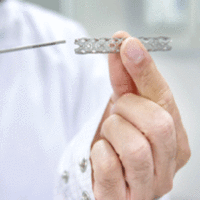 When plaque builds up in an artery, it may cause the artery to narrow, which reduces blood flow. This may cause an increased risk of a heart attack. For this, a stent is used to reopen the narrowed artery, reducing the risk of a heart attack. For most people, the placement of a stent results in successful treatment, but on rare occasions complications may arise. If you were the victim of a defective medical device, you may be wondering what your rights are.
When plaque builds up in an artery, it may cause the artery to narrow, which reduces blood flow. This may cause an increased risk of a heart attack. For this, a stent is used to reopen the narrowed artery, reducing the risk of a heart attack. For most people, the placement of a stent results in successful treatment, but on rare occasions complications may arise. If you were the victim of a defective medical device, you may be wondering what your rights are.
A stent is put into an artery and inflated. It then locks in place and forms a scaffold, which holds the artery open. A bare-metal stent has no special coating and props open blood vessels after they are widened. However, even with a stent, arteries have the potential to become blocked again.
To avoid this from happening, doctors may use a drug-coated stent. This type of stent releases medication that may reduce the risk of arterial scarring and restenosis. Drug-coated stents are preferred over bare-metal stents, but drug-coated stents require longer treatment. The risks of drug-coated stents may include blood clots, stent migration, infections, and allergic reactions.
If you are pregnant or are nursing, you should not use drug-coated stents. People who are allergic to stent material should also avoid getting a drug-coated stent. After having a stent put in, a person will need to be treated with Aspirin, as well as anti-clotting drugs for at least a year to decrease the risk of clotting.
Stents are needed in people suffering from obstructive artery disease, which causes chest pain or shortness of breath. When a person’s symptoms affect their everyday life, they may want to consider getting a stent.
The Food and Drug Administration (FDA) has been monitoring drug-coated stents and found that some of its ingredients are also found in drug products approved for the treatment of other diseases, while other ingredients have yet to be approved. Research also shows that there is still a significant risk of blood clotting that occurs in the stent. When used for the approved treatment of other diseases, drug-coated stents are safe and effective, according to the FDA.
Drug-coated stents are just one option for treatment. Alternative treatment options include lifestyle changes and the use of medication; coronary bypass surgery, which is done so that blood can go around blocked arteries in your heart; and angioplasty and bare-metal stents.
If you or someone you know was the victim of a defective medical stent, a Philadelphia defective medical device lawyer at Brookman, Rosenberg, Brown & Sandler can help. Our lawyers have experience dealing with defective medical device claims and will fight to obtain the compensation you deserve. For a free consultation, contact us online or call us at 215-569-4000. Located in Philadelphia, we proudly serve clients throughout New Jersey and Pennsylvania, including Delaware County, Chester County, and Philadelphia County.